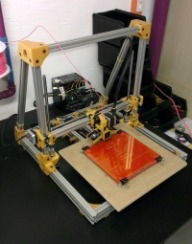Lautr3k
Discussion in '3D printers' started by skarab, Jan 7, 2014.
Lautr3k RepRap
Discussion in '3D printers' started by skarab, Jan 7, 2014.
A 3D printer without belts, a print volume of 320x320x260mm, obviously the V-Slot as linear guide! and a maximum of printed pieces.
Page 14 of 17
Page 14 of 17
